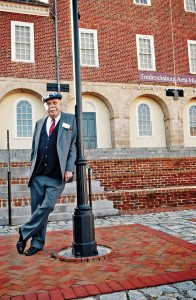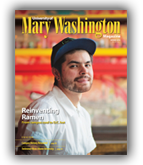Distinguished Professor Emeritus of Philosophy George Van Sant passed away Jan. 20, 2013, at age 83. He retired from UMW in 1990, and in 2004 he moved to Irvington, Va., with his wife, Melina Van Sant. She survives him, as do a daughter, four stepchildren, and nine step grandchildren. He was preceded in death by his son, Edward Van Sant, and by three wives, Shirley Van Sant; Peggy Van Sant, the mother of his children; and UMW Professor of English Susan J. Hanna.
 David Cain, distinguished professor of religion, offered this remembrance of his colleague and friend, George Van Sant, distinguished professor emeritus of philosophy, who passed away in January.
David Cain, distinguished professor of religion, offered this remembrance of his colleague and friend, George Van Sant, distinguished professor emeritus of philosophy, who passed away in January.
The richer we are because of someone, the poorer we are when that someone is gone. Such a someone was George Van Sant. Some close to him called him “George”; some called him “Van” − almost as if his multifariousness needed more than one name. George or Van, as I knew him, was a commanding presence, not only because of his size, his outer demeanor, but also because of his inner demeanor, his internal energy, his conviction, his life.
Van’s conviction empowered his engagement. Van was as well-known as any Mary Washington faculty member has ever been, a defining presence and voice of the faculty. Before he retired, he had served on nearly every committee and as longtime department chair, both of the Department of Philosophy and of the Department of Classics, Philosophy, and Religion − CPR. No one could with greater justification be called “Mr. Mary Washington,” whether entering with gusto and Wittgenstein T-shirt into volleyball at CPR picnics on Washington Avenue, parading up and down Campus Walk with bullhorn, announcing acts at Mary Washington Multicultural Fairs, or leading his colleagues as marshal of the faculty, a post he commanded − both actually and symbolically − from 1968 to 1975. “His tall figure stands out in academic processions as he carries the mace with impressive dignity and the military bearing one would expect of a colonel in the Marine Corps Reserve,” Edward Alvey Jr. wrote in his History of Mary Washington College, 1908-1972.
Entries concerning Van in Bill Crawley’s University of Mary Washington: A Centennial History, 1908-2008, among the most numerous in the huge volume, where his name is preceded by “veteran,” “venerable,” “legendary,” “esteemed,” etc., evidence his manifold concerns and investments.
Devoted to his discipline of philosophy, he was proud of CPR and of the department’s celebration of the liberal arts, of the humanities, and of interdisciplinary studies. Decades of students enjoyed and remember his “Introduction to Logic,” “Morals and Society,” “Philosophy of Science,” “History of Scientific Thought,” and “Kant,” among many other courses. Distinguished Professor of Philosophy George Van Sant received the Grellet C. Simpson Award for Excellence in Undergraduate Teaching in 1986. A decade later, he was elected an honorary member of Kappa of Virginia, the Mary Washington chapter of Phi Beta Kappa. The group’s spring 2011 initiation ceremony featured a special address by Van.
Nowhere was Van’s conviction more forcefully evidenced than in regard to race relations. Following the early observances of Martin Luther King Jr. Day at Mary Washington College, Van led a packed Dodd Auditorium assembly out hand-in-hand to form a vast circle of hand-holding fellowship in Ball Circle.
Van was a grand ambassador for Mary Washington both internally and externally. His contributions to Fredericksburg trace “another life.” Wide-ranging interests were complemented by wide-ranging friendships. Mention someone in Van’s company, and chances are he knew him or her − and had stories to tell, amusing, kind, warmhearted stories, casting a revealing and lavish light back upon the storyteller. Likewise, Van was an imaginative and generous host. His doors − office and home − were ever open to diverse gatherings, bringing friends and strangers together.
Mary Washington would not have been − would not be − Mary Washington without him. His impact is everywhere.
David Cain wishes to thank Richard E. Hansen, distinguished professor emeritus of English, for editorial suggestions.
